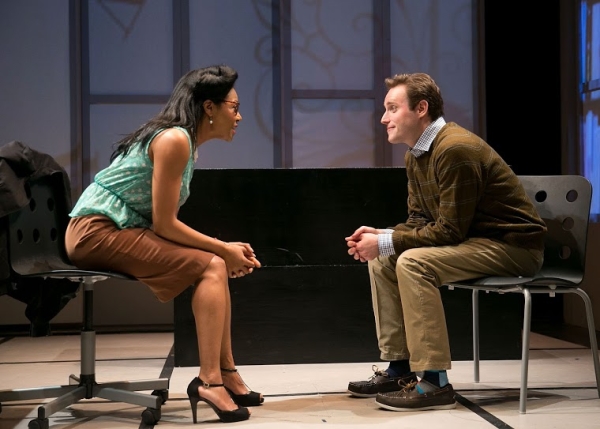Honky Playwright and Former Adman Greg Kallares Doesn’t Mind If His Play Offends You
Honky is a dark comedy about race and racism written by former advertising writer Greg Kallares (he worked on campaigns such as Monday Night Football’s “Is it Monday Yet?”). Honky received its world premiere in March at Urban Stages, where it was incredibly well-received. Now the play is back at Urban Stages for a run through November 17.
TheaterMania spoke to Kallares about how the play has changed, why he’s chosen to write about race, and how he has pushed his actors out of their comfort zone.

(© Ben Hider)
How did you get brave enough to tackle the topic of race?
You know, I usually write what I’m scared of and what I’m confused about, so I started with the idea of language. Once it started there, I kept opening boxes, and every time I opened a new box, I kind of wanted to deal with it. I’ve seen so many plays about race or other issues, and I guess I was tired of being preached to or made to feel guilty. There’s so much self righteousness sometimes in the theater. So I didn’t want to do that. I wanted to write a play that was very honest and very funny because it was very honest and to use humor as a way get people to actually talk. That felt new and interesting to me, and so with each of those boxes that I would open, I felt like I could tackle it if I just stayed honest to each character specifically and not to some higher idea of a race play.
Were you worried there would be backlash about the play?
I think at a certain point while writing the play, I accepted that people were going to be offended by the play and that that was OK — as long as it was truly from the perspective of these characters and there wasn’t shock for shock value’s sake and it didn’t feel false in any way. I’ve had a lot of people tell me that they were offended by the play only after they found out that I was white. And I’ve had people tell me that they loved the play, and then they found out that I was white and got confused. The reactions have been so varied and interesting. Everyone has their own personal messy issue with race. But actually I’ve been surprised at what a small number of people have been truly offended by the play. Most people seem to get what it’s saying and appreciate the fact that it’s starting a conversation.
Have you changed anything since the first run?
I switched a scene order here and there, and I tightened some stuff, but nothing severe. The biggest changes that we made throughout the production were when the actors were able to look at the play from a different perspective, I think. They went away and they came back and they were saying, ‘I realized I didn’t explore this enough; I didn’t have enough time to really chew on this.’ And I was like, ‘OK! Let’s see what we can do!’
How have your actors dealt with the language and the race issues?
Bravely. I was talking to one actor, and he said he was laughing hysterically [when he read the play], and then when he realized he had to say these things, he was like, ‘Whoa, OK, I have to put my actor hat on because I think this play is hilarious, but I’ve got to say these things now and that is a different thing.’ These actors have really just embraced it wholeheartedly because they really fell in love with their specific characters and made something out of [them]. I think the brashness of the language kind of helped them get there. It just kind of pushed them in this new place.
Is this play as much about the language as it is about the subject matter?
It absolutely is. It was fun to write a play where language was the antagonist. Every character in the play deals with language and how to navigate language [it]. That’s so much of the play to me. Yes, it’s about race, and yes, it’s about commercialism and all that stuff, but so much of it is about the awkward phase that we’re in in terms of race. I think this stems from the fact that we might be a little more evolved, but the language hasn’t caught up with us. That’s where a lot of the humor stems from.
Is one theme in the play that we care about more being called racist than actually being racist?
It’s definitely a theme. There’s this idea in the play about guilt and being called a racist or even having it inferred that you might be racist. The fear of that is so incredible, but it’s also so incredibly out of context — because it is not a fear that comes from anything real. It’s not actually connected to anything real because you’re not talking about feeling guilty for specific things. So yes, the idea of being called a racist is so scary.











